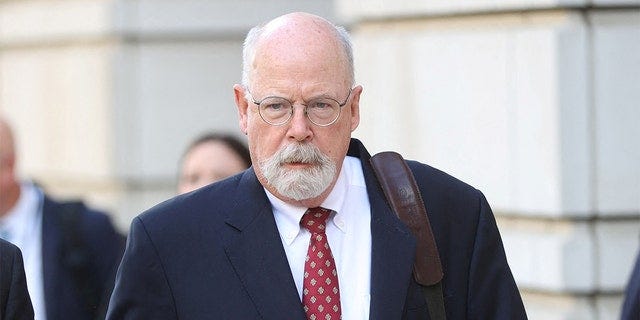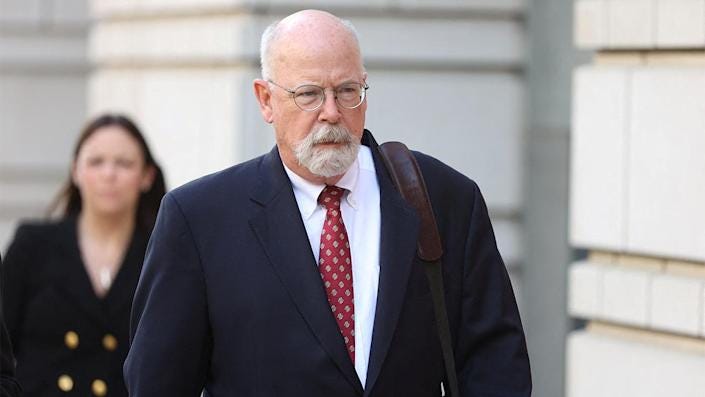You are using an out of date browser. It may not display this or other websites correctly.
You should upgrade or use an alternative browser.
You should upgrade or use an alternative browser.
John Durham
- Thread starter PJay
- Start date
And hangings.
Supposedly the text message from Sussman requesting the meeting stating he was not representing anyone has been thrown out by the judge. Durham and company didn't know about it when the initial indictment was presented and the statute of limitations had run out to have it added.
Hijinx
Well-Known Member
The Judge is working hard for Sussman.Supposedly the text message from Sussman requesting the meeting stating he was not representing anyone has been thrown out by the judge. Durham and company didn't know about it when the initial indictment was presented and the statute of limitations had run out to have it added.
PJay
Well-Known Member
Kash Patel – Convictions Coming, More Indictments Coming, We Caught Them All
I'm not surprised.Acquitted...
The jury included one federal government employee who told the judge they donated to Democrats in 2016 and another government employee who told the judge they "strongly" dislike former President Trump. Both of those jurors told the judge they could be impartial throughout the trial.
The jury also included a teacher, an illustrator, a mechanic and more. One juror had a child who was on the same high school sports team as Sussmann's child.
The FBI Paid For Russian Disinformation To Frame Trump—And 7 Other Takeaways From Durham’s Latest Court Filing
The FBI made Danchenko a confidential human source, providing him and the FBI’s use of him “national security” cover, in March 2017 and terminated that designation in October 2020, according to the court filing unsealed on Sept. 13. Danchenko is the originator of the false claim trumpeted all over global media that Donald Trump told prostitutes to pee on beds the Obamas had slept in in a Russian hotel.
The FBI had previously targeted Danchenko, Christopher Steele’s primary source, as a possible Russian agent. But after discovering Danchenko’s identity as Steele’s Sub-Source No. 1, rather than investigate whether Danchenko had been feeding Steele Russian disinformation, the FBI paid Danchenko as a CHS.
I didn't realize Durham was still alive.
PJay
Well-Known Member
My 12 Predictive Points for the Danchenko Trial, Slated To Begin On October 11
He is. Trial soon. Stopped updating because...not time to wake you.I didn't realize Durham was still alive.

My 12 Predictive Points for the Danchenko Trial, Slated To Begin On October 11
People’s Brains Will Literally Lock Up In Cognitive Dissonance As They Watch This Trial As Dozens of Fake Narratives Die Screaming Inside Their Heads
PJay
Well-Known Member

DurhamWatch Thread Sept 16, 2022 Danchenko edition
Igor Danchenko, the main source of the collection of lies that made up the Russiagate Dossier, was paid by the FBI....
Special Counsel Durham’s Protect-The-Establishment Approach Is Destroying The Country
The special counsel charged Danchenko late last year with lying to the FBI concerning his role as Christopher Steele’s primary sub-source. Earlier this month, Danchenko asked the court to dismiss the charges against him, claiming his supposed lies to the FBI were not “material” to the government’s investigation. “Crossfire Hurricane agents never intended to drop their investigation of Donald Trump, and therefore any lies he told the FBI did not affect their decision-making,” Danchenko argued in his motion to dismiss.
As I explained at the time, Danchenko’s argument is wrong as a matter of law because for a lie to be “material,” “the falsehood need not actually influence the agency’s decision-making process, but merely needs to be ‘capable’ of doing so. Thus, legally speaking, that the Crossfire Hurricane team, and later Special Counsel Robert Mueller’s office, seemed unconcerned with what Danchenko said … is irrelevant. The question is whether the lie was capable of influencing how a hypothetically ‘objective’ government official would have acted had they known the truth.”
The reality remains, however, that the jurors will be unlikely to believe the government’s argument that Danchenko’s alleged falsehoods “were capable of influencing several decisions of the FBI agents,” unless Durham “tells the jury that Danchenko’s alleged lies did not actually influence the government’s investigation because the agents were out to get Trump.” But additional pre-trial court filings from the last 10 days indicate the special counsel’s office has no intention of taking that tack, and will instead argue to the jury “the fact that the FBI apparently did not identify or address” inconsistencies in Danchenko’s stories or follow up with his contradiction of the Steele dossier.
This approach seems destined to fail, doubly so given the recent revelation that the FBI made Danchenko a paid confidential human source (CHS) in March 2017 — a designation Danchenko held until October of 2020. The FBI cleared Danchenko as a CHS even though he had been a subject of an FBI counterintelligence investigation from 2009 to 2011, based on claims that he had “engaged two fellow employees about whether one of the employees might be willing or able in the future to provide classified information in exchange for money.”
Durham Prosecutes FBI Informants, While Protecting Their Handlers
But as the cases against the informants have gone to trial, defense lawyers have revealed evidence that cuts against that narrative. FBI investigators look less like guileless victims and more like willing partners in the fraudulent schemes Durham has brought to light.
Notwithstanding his reputation as a tough, intrepid prosecutor, Durham has made excuses for the misconduct of FBI agents, providing them a ready-made defense against any possible future prosecution, according to legal experts.
"Durham was supposed to clean up the FBI cesspool, but it doesn't look like he's going to be doing that," said Paul Kamenar, counsel to the National Legal and Policy Center, a Washington watchdog group. "He started with a bang and is ending with a whimper."
In the latest example, critics point to a flurry of pretrial motions in Durham's case against former FBI informant Igor Danchenko, the primary source for the false claims regarding Trump and Russia advanced by the opposition research paid for by Hillary Clinton's campaign known as the Steele dossier.
PJay
Well-Known Member
Durham Was Tasked With One Main Objective For His Special Counsel Investigation

Durham Was Tasked With One Main Objective For His Special Counsel Investigation
And Hardly Anybody Seems To Remember What That Is
